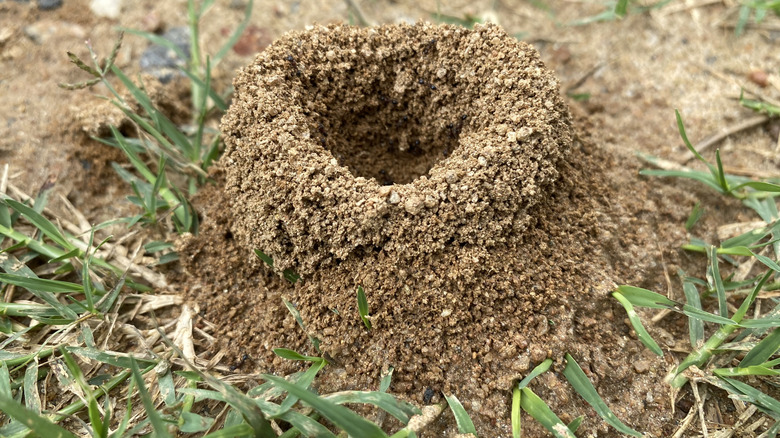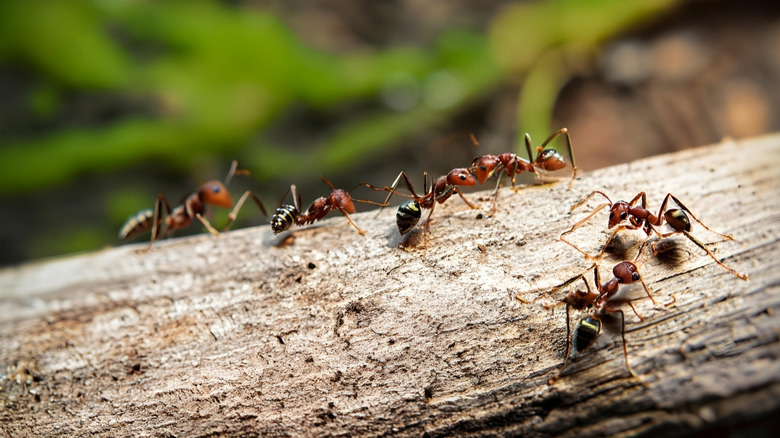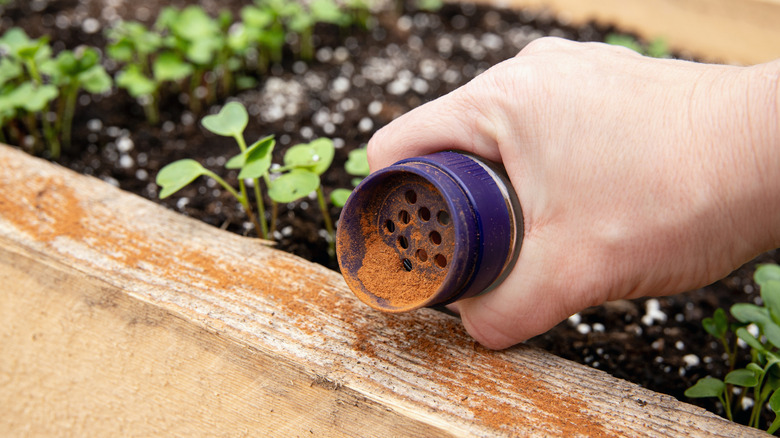Why That Ant Hill Might Be The Best Thing For Your Garden
Ants might not be your favorite garden guests — especially when you spot a towering anthill popping up in your lawn or nestled between your plants. The usual reaction is to reach for the hose, the shovel, or your go-to DIY pest control remedy to get rid of them. But before you go to war, it's worth pausing to consider what those tiny insects are actually doing — and why that anthill might be the best thing for your garden.
While large numbers of ants and certain ant behaviors (such as protecting aphids) can cause trouble, most of the time these hardworking individuals are busily improving your garden's health. From enriching the soil and reducing pests to cleaning up debris and even planting wildflowers, ants can be good for your garden, playing an underrated but essential role in your backyard ecosystem. Viewed from that perspective, the anthill you're so eager to remove could be the reason your plants are thriving.
Surprising ways ants help your garden thrive
An infestation of any creature can be problematic, and ants are no different. However, in moderate numbers, they're actually a sign that your garden is happy, healthy, and thriving. Ants build hills to protect and access their nests. Because ants build their nests underground using a network of tunnels, they aerate the soil, which helps water and nutrients reach plant roots. With less chance of waterlogging, the roots stay healthier for longer.
Figuring out natural pest control in your garden is important. And ants are happy to take up the mantle by feeding on unwanted intruders — potentially reducing the need for store-bought treatments that are often harmful to your garden. Some ant species even help with seed dispersal in a process known as myrmecochory. In this mutually-beneficial relationship the ants collect the seeds to feast on their nutrient-rich food attachments (called elaiosomes). In return, the ants are ensuring the plant's seeds are spread around.
It doesn't stop there. If you spot an anthill in your yard, these critters will also be keeping busy as nature's cleanup crew. They recycle dead insects and organic garden debris back to the earth, enriching the soil with much-needed nutrients. When we think of pollinators, bees typically spring to mind, but ants also do their bit to assist mother nature by transferring pollen — albeit unintentionally — from plant to plant as they forage.
How to prevent anthills in your garden
While there's no doubt ants can benefit your garden, you might not want them building hills all over your lawn or flower beds. Fortunately, there are several ways to make your garden less appealing to them — without resorting to harsh chemicals. Start with regular garden care. Keep your lawn trimmed, prune overgrown plants, and remove debris like fallen fruit, branches, and wood piles. These are all ant magnets. Water your garden consistently, too — ants prefer dry soil, so a well-hydrated space is less likely to attract them.
Tilling the soil once or twice a year can also help. It disturbs any nests that may be forming and makes the ground less inviting for future colonies. Keep an eye out for pests like aphids and mealybugs, which ants "farm" for their sugary secretions. Controlling these pests removes a major food source for ants. It's also worth adding some natural repellents like cinnamon, lemon juice, and citrus peels to your anti-ant arsenal. While there are plenty of other tricks to eliminate anthills in your yard (like boiling water or vinegar), prevention is a far kinder and more effective long-term strategy. With regular upkeep, natural deterrents, and a little vigilance, you can discourage ants from settling in the first place — no cruelty required.


